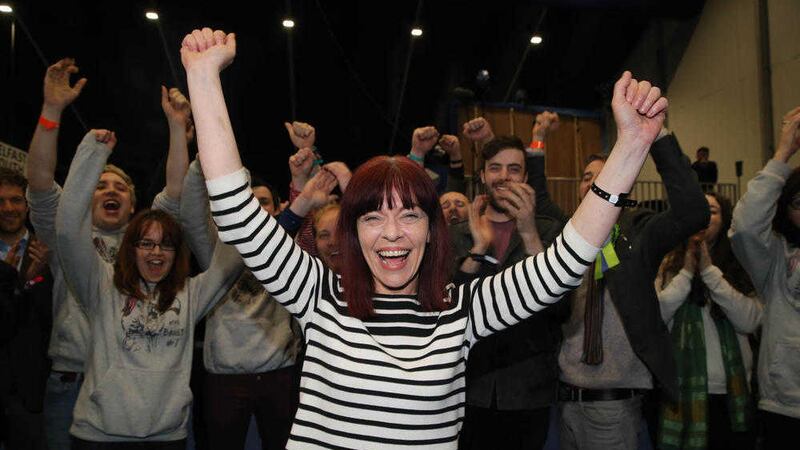An increase of 10 in the total of women MLAs, there's a thing - except it wasn't, all that much.
It queued for notice behind the big stuff; nationalist vote still sliding, some kind of formal opposition - and then the wooing of independent unionist Claire Sugden. That she is female has been nothing to do with it, though the twist is that the prime mover is another woman, this one at the top of Stormont's little heap, another visual change in the political furniture.
In the latest mini-drama over the past couple of weeks, leading man after leading man has been positioned sweetly in front of cameras between female colleagues, in some cases brand new to Stormont. Doughnuts, as we all now know that they're called, the placing of silent companions around someone meant to be significant. Even the crudest choreography is still an advance, acknowledgement of the relatively recent and infrequently voiced internal assessment that to have women to the fore is good for a party.
With that still sinking in, the ploy with the MLA for East Londonderry attracted unrelated criticism and questioning. The most exasperated marvels that Sinn Féin didn't realise how Arlene Foster's slap down for an SF justice minister sounded to their faithful voters, and some they have recently lost. Nobody openly admitted fretting about Sugden's gender. More progress.
Some raised experience, few ability. Competence in ministers is rare enough. Why shouldn't women be as incompetent as the men? The Dáil fix to make a government out of near stalemate had no sooner been unveiled, with its crop of buttered-up independents, than `super-junior' health minister and independent Finian McGrath wanted smoking areas in pubs for the `hopelessly addicted', apparently how he sees himself. He has built a following on just such stands.
How Stormont's version of buttering-up develops may relate to Sinn Féin loss of touch, one of the underlying trends, but will have nothing to do with another - the recognition of female political clout. Regardless of their ability, it is women in politics who take most abuse of the ugliest kind: one reason why fewer women than men fight to get into the business. The trio of British MPs who went public at the weekend about their experience of `trolls' bore chilling witness in their very different ways. But women are half of the population. They get votes, male as well as female.
Voters like being offered women candidates: awful, simple stuff, beyond shame that like much else in the case for women's equality it should still need to be argued. From the outside, for example, it is hard to imagine how anyone can present without major embarrassment the Catholic church's entire case against allowing women priests. Jesus chose only men as apostles, right? It is easy by contrast to see why that discussion is supposed to be permanently off the agenda.
The finaglings of a semi-legislature in a small divided region have to be of limited interest, in a world where cruel misogyny makes women and very young girls the spoils of war, where women may not leave their homes safely without a male escort, are not permitted to sing, or drive, where only their eyes don't have to be veiled and even then are covered by a mesh.
But prejudice and entrenched inequality has the same quality regardless of scale. When pushed back it's worth a cheer. And the increased number of women MLAs could become a concerted force. The rate of domestic violence is increasing here while it falls in England and Wales, and a new, much-delayed `strategy' agreed by the departments of health and justice to tackle it is a slow starter.
Women and girls, and a much smaller number of men, suffer where everyone should be safest, at home: 737 rapes among the 3,000-plus cases reported last year, and probably many more unreported, police called out every 20 minutes.
Unlike the other pressing question for women of abortion provision - pressing in particular because tablets bought online are surely a disaster waiting to happen - domestic violence is not contentious. The mostly male abusers who terrorise their families come from all sorts of backgrounds, rich and poor, republican and loyalist among them, convicted criminals, holy Joes, lawyers, and police. If women MLAs should want a common cause, here it is.
No more than Arlene Foster's election as DUP leader or First Minister was a victory for women, the 30-strong class of 2016 doesn’t make a feminist surge. Good stuff, all the same.








